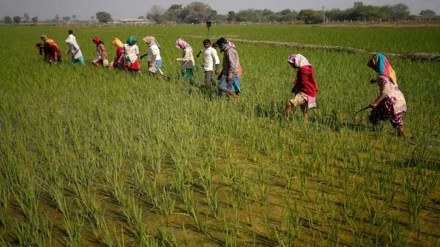India’s exports of agricultural commodities are unlikely to gain much from US President Donald Trump’s recent exemption of select food items from reciprocal tariffs.
“We really had a small share in exports of those items in the latest reciprocal tariff exemption by the US, thus there is not much impact expected for India’s agri-products,” Ajay Srivastava of Global Trade Research Initiative (GTRI) told FE.
A White House order on November 12 excluded coffee, tea, tropical fruits, cocoa, spices, bananas, oranges, tomatoes, beef, and certain fertilisers from the April 2 reciprocal tariff regime.
“For the tariff-exempt products identified in the order, India today supplies only $548 million of America’s $50.6-billion import basket—reflecting a narrow export footprint,” according to the GTRI note.
It noted that while the tariff shift could marginally improve India’s competitiveness in spices and niche horticulture, broader gains are expected to go mainly to major Latin American, African, and ASEAN exporters unless India scales up production, develops cold-chain infrastructure, and diversifies its agricultural export portfolio.
Key Indian agricultural exports to the US, including shrimp, other seafood, and basmati and non-basmati rice, were excluded from the tariff relief.
Among the exempted items, India’s shipments are limited to high-value spices and niche products: pepper and capsicum preparations ($181 million), ginger-turmeric-curry spices ($84 million), anise and cumin seeds ($85 million), cardamom and nutmeg ($15 million), tea ($68 million), and smaller quantities of coconuts, cocoa beans, cinnamon, cloves, and fruit products.
“There would be insignificant impact of the India’s exports to the US on this tariff exemption on spices,” Ankit Agarwal, director, Amar Agarwal Foods India, a Tamil Nadu-based turmeric trader, said.
GTRI also noted India has almost no presence in some of the largest exempted categories, including tomatoes, citrus fruits, melons, bananas, most fresh fruits, and fruit juices.
Bilateral agri-trade between India and the US stood at around $6.6 billion in 2024, with India exporting $5 billion in agricultural goods and importing $1.5 billion.
Seafood, largely frozen shrimp, remains India’s largest agricultural export to the US, accounting for $2.8 billion of $7.38 billion in FY25 shipments. Other key exports include basmati rice, spices, coffee, and tobacco.
Meanwhile, the European Union’s approval of 102 additional fishery units for shipment is expected to cushion the impact of U.S. tariffs and provide Indian seafood exporters greater access to the European market.
